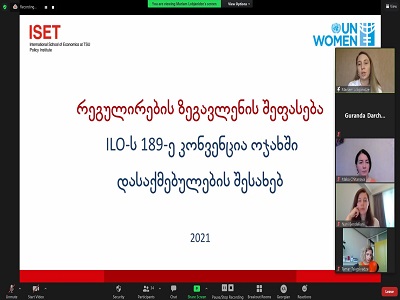Lead ISET Economist to Edit Prestigious Economics Journal
- Details

Under ISET affiliation Luc Leruth, the Lead Economist in the Policy Institute’s Governance and Social Policy Research Center, has recently been appointed a co-editor of The Open-Access, Open-Assessment Journal Economics. As a new form of academic journal, the publication incorporates a large research community with an open and innovative peer review process; where critically the research is seen as a cooperative enterprise between authors, editors, referees, and readers.
Naturally, we’re proud of the achievement and delighted that our economists are always working on innovative, international research. Luc thus joins our other established academics in collaborating on noteworthy global research. As such, he is not solely supporting local projects, but the wider economic world and Luc is undoubtedly helping to promote both Georgia and ISET with his sterling contributions to the field.
Women’s Economic Empowerment in Domestic Work
- Details

ISET is proud to announce its most recent joint research presentation into our impact assessment on domestic work and its influences on female economic empowerment in Georgia. Supported and funded by the Swiss Agency for Development and Cooperation, the Austrian Development Cooperation, and hosted by UN Women, the presentation aimed to highlight women’s labor rights and access to reasonable work. As economic empowerment is such a vital, and under regarded, subject the presentation also sought to publicize the findings of ISET’s research and the WeResearch post-COVID survey to help raise awareness of women’s informal work in Georgia.
In collaboration with UN Women, ISET Policy Institute implemented a regulatory impact assessment (RIA) on domestic workers that emphasized many of the problems that the sector faces. In essence, domestic workers substantially contribute to the economy by providing crucial services to households. Critically, the majority of domestic workers are women and are informally employed, with fewer rights, lower salaries, and poorer working conditions. Georgian law currently only offers provisions for formally employed workers, leaving domestic workers underrepresented, therefore their societal value, treatment, and legal employment are all truly significant issues.










